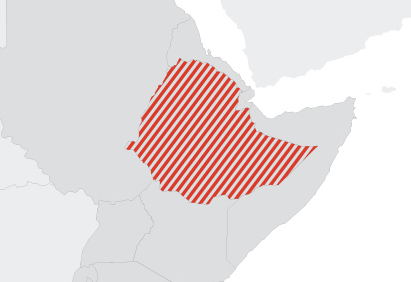The UN Human Rights Council took an important step to address the human rights dimensions of the conflict in Ethiopia by establishing an independent investigation. DefendDefenders welcomes the move the Council took at the end of today’s special session and calls on all parties to the conflict to cooperate with the newly established mechanism, the International Commission of Human Rights Experts on Ethiopia.
“The Council’s decision to create an investigative mechanism reflects the international community’s utmost concern about Ethiopia,” said Hassan Shire, Executive Director, DefendDefenders. “The International Commission will shed light on violations of international law committed by all parties to the conflict in a neutral and objective manner.”
The resolution adopted today strongly condemns widespread violations of international law, including human rights and humanitarian law, some of which may amount to war crimes and crimes against humanity. It urges all parties to end the deliberate targeting of civilians and to facilitate humanitarian access.
The Council adopted it at the end of a special (emergency) session convened at the request of over 50 states. The new mechanism will be tasked to investigate all violations and abuses, including their gender dimensions, to establish their facts and circumstances, and to identify those responsible in support of accountability efforts.
In July 2021,[1] the Council adopted its first-ever resolution on Ethiopia to address the crisis in the country’s northern Tigray region. Since then, atrocities have continued to be reported and the conflict has spread to neighbouring regions, namely Afar and Amhara. Human rights defenders, civil society, and journalists are facing intense pressure.
In November 2021, a group of NGOs including DefendDefenders stressed[2] the need for the Council to take a further step to respond to the crisis in Ethiopia. In a letter, they called on states to convene a special session of the Human Rights Council. They also emphasised the need for any international mechanism to be “complementary to regional efforts to address the crisis” — something the new International Commission will do, in particular by collaborating with the Commission of Inquiry set up by the African Commission on Human and Peoples’ Rights (ACHPR) and with African Union (AU) bodies as well as the Intergovernmental Authority on Development (IGAD).
For more information, please contact:
Estella Kabachwezi
Advocacy, Research and Communications Manager, DefendDefenders; [email protected] or +256 782 360 460 (English)
Nicolas Agostini
Representative to the United Nations for DefendDefenders; [email protected] or +41 79 813 49 91 (English and French)
[1] DefendDefenders, “Ethiopia: at the UN, a first step towards long-overdue action on Tigray,” 13 July 2021, https://defenddefenders.org/ethiopia-at-the-un-a-first-step-towards-long-overdue-action-on-tigray/ (accessed on 17 December 2021).
[2] DefendDefenders et al., “Ethiopia: The UN Human Rights Council should urgently hold a special session to address the ongoing human rights crisis,” 22 November 2021, https://defenddefenders.org/ethiopia-the-un-human-rights-council-should-urgently-hold-a-special-session-to-address-the-ongoing-human-rights-crisis/ (accessed on 17 December 2021).

